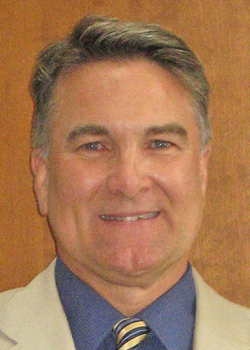
FILE PHOTO- Rep. Ron Highland, far right, speaks during a legislative luncheon with Riley County commissioners on Nov. 10, 2016. Also pictured are Commissioner Ron Wells, left, and Rep. Sydney Carlin, middle. (Staff photo by Brady Bauman)
Updated: Thursday, 5:56 p.m.
Riley County Commission Chairman Ron Wells said Thursday morning payments have been set up for city sewer service.
“I went and met with the city and offered to pay back to April of last year on my use,” he said during commissioner comments at Thursday’s regularly scheduled commission meeting.
Wells added the estate, which is in his mother’s name, will begin payments to the city in 2018.
Wells has been the focus of a matter involving family-owned property and sewer services there after a front-page article in Sunday’s Topeka Capital-Journal revealed the property hadn’t been paying for sewer services for decades.
Monday afternoon, county officials found documents that support Wells’ assertions the county made a deal with his parents after the county improperly installed a line through a farm field on the property in the 1960s.
During Monday’s commission meeting, Wells said that morning there’s no big conspiracy concerning free city sewer services on family property.
The documents were sent to KMAN by county planning and development director Monty Wedel. The easement document, dated Dec. 13, 1966, says the county “agrees to give” the Wells family the use of 11 sewer hook-ups.
Wells, who sarcastically refereed to the matter as “sewergate” Monday morning, has repeatedly said his parents worked out a deal with the county sometime around 1965 for free sewer services after an error by the county put a sewer line through a farm field owned by the Wells family. Wells says then-county engineer Dan Harden wrote a letter to his father that stated the county would agree to allow two free sewer hook-ups to the line if it was allowed to stay, instead of being dug up and moved. Wells said he is still searching for that documentation.
Harden told the Capital-Journal he didn’t recall such an agreement, but didn’t rule one out, either.
Another sewer line, installed in 1980, according to Wells, is not used by the property and passes through.
“Things were done back then with a gentleman’s handshake, not by today’s standards,” Wells told media later during Monday’s meeting.
The easement document doesn’t list any payment information, though the second page is faded and difficult — if not impossible — to read. Wedel said via email that an original copy may be in the Hutchinson salt mine where the county keeps such documents.
Wedel also sent KMAN the building permit for Wells’ parent’s house, which notes its hook-up to the sewer system.
“Well, I had an interesting weekend,” Wells stated during Monday morning’s meeting. “‘Sewergate’ is what I call it. Many incorrect items. As it turns out it wasn’t even the correct sewer or anything.”

Fehr
Monday evening, Manhattan City Manager Ron Fehr told KMAN the city is still trying to figure out the basics.
“I think there’s a lot of research to be done yet,” Fehr said. “We’re clearly in a research mode.”
Fehr said he and Wells met Monday afternoon and that Wells, along with city and county officials, will meet again this week. Fehr added it’s unclear when the city took over the sewer lines from the county and that he is waiting on documents from the county regarding that timeline.
“A lot of that has to be sorted out, relative to where we go from here,” he said.
Fehr also said such confusion about older service lines is common.
“It is,” he said. “It just depends on the record-keeping back in that time. Everything is paper copy.”
Fehr said he wasn’t comfortable estimating a value of the services the Wells property has received due to how incomplete the information is.
Riley County Clerk Rich Vargo told Wells the county would research its files for documentation on the sewer lines, as it would for any taxpayer.
Wells said the matter came to light in 2016 after a county employee began looking into Wells’ building permit application for work to convert part of a barn into an apartment for himself. Wells, a widower, said he has been overseeing the property, which includes his parent’s house he helped build with his father and brothers. Wells’ mother has been living in the house until recently. Wells said she’s been in declining health and moved out of the home within the past couple years. She now lives with his brother in Salina, but has insisted the house be kept how it is and uninhabited.
During commissioner comments Monday, Wells said he’d have no problem paying back fees for the time he’s been living in the apartment, which uses city sewer services based off the line installed by the county during the 1960s.
“I’ve never hid anything,” he said. “And whether I’m obligated for a year, year-and-a -half sewer fee, I’m fine with it.”
Wells later admitted to the press Monday he should’ve investigated the matter with the city, as he was advised to do by county officials.
“That was a shortcoming on my part,” he said.
According to the Capital-Journal, Steve DeHart, a former environmental health specialist for the county, was the one who raised the issue in April 2016.
DeHart was fired by the commission four months ago, according to the Captial-Journal, with Wells being one of those approving votes.
Wells, a Republican born and raised on a farm in Riley County, was first elected to the county commission in 2012 and was re-elected in 2016. Before becoming a commissioner he was a retired contractor.
Wells spoke with two Capital-Journal reporters last Thursday morning in his office after an exceptionally short, uneventful commission meeting that adjourned just after 9 a.m.
Wells said the Capital-Journal was approached by DeHart.
The post Wells says family-owned property to begin sewer payments to city appeared first on News Radio KMAN.

